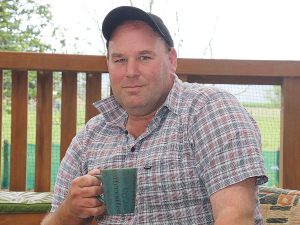A steep learning curve, a very busy year and thank heavens for tractor therapy. That's how Associate Agriculture Minister Andrew Hoggard described his first year in Parliament to reporter Peter Burke at his dairy farm in the Manawatu during the holiday break.
Although an experienced politician, having 18 years with Federated Farmers before standing for the ACT party at the last election, Andrew Hoggard says he not only had to learn how Parliament in general runs, but also the ins and outs of what's required for being a minister.
"At the ministerial level there is a whole layer of rules, procedures and processes that you must follow. Then there is the learning to do with my own portfolios - especially the biosecurity space - and getting an understanding of all the threats that are out there and our preparedness for them," he says.
Hoggard says the global issue of bird flu and what has happening in the US, combined with the outbreak of H7N6 at a free-range poultry farm in Otago, has kept him on his toes. He says the issues that he's been dealing with as a minister are like the ones he was involved with while at Fed Farmers but now these are in a different forum.
"Previously I'd be rocking down to Wellington for a day and then going home to milk the cows the next morning. But now I am staying in the capital three nights a week and I have more control over the outcomes of the issues, as opposed to the past where in many cases I was beating myself against a brick wall," he says.
Now Hoggard says he's enjoyed being able to make changes to some of the things that have troubled many farmers, including himself. One of these is stock exclusion rules which the industry itself had addressed and was putting unnecessary pressure on extensive sheep and beef farmers, being completely unworkable. He says in the case of the latter, a few cattle or sheep walking through a stream to get to the next paddock was going to cause at best minimal impact. The other issue he's been dealing with is winter grazing rules - rules he describes as a complete overreach by government - and the removal of the ETS backstop provision.
Hoggard also believes that the pause on freshwater farm plans to get a better system in place and remove duplication of effort will benefit farmers. He says farm plans are fundamentally good tools for farmers.
Plans for 2025
Traditionally, the second year in office of any government is the 'doing year'. For a newly elected government such as this coalition, the first year in office is about dealing with high priorities and then figuring out the next set of actions and moving quickly to enact new legislation and reforms.
While Treaty of Waitangi debates may be the headline issue, some very important changes are in the wind that have implications for the wider agriculture sector and Andrew Hoggard will have a part to play in many of these.
"Probably the big work this year will be the RMA. I am on the ministerial groups for the new National Environment Standards (NES) for freshwater and RMA, so those will be pretty heavy workstreams and some big decisions will have to be made there.
"Then there is the National Policy Statement on indigenous biodiversity, vegetable growing and water shortage; ones where I have got the sign off on the environmental side," he says.
The other big issue on the agenda for Hoggard is a bill to allow the resumption of live animal exports by sea. He also expects a lot of discussion around climate change and how NZ should sit in relation to what other countries are doing. He says gene technology is another issue and says it'll be interesting to see where people go on this.
"Personally, I want as many options as I can for my farming system, and if there are other people out in the world using these, then I want to use them," he says.
Hoggard says the role of government should be to determine whether a technology is 'safe' and not to make the marketing decisions on its use. He says if Fonterra believes it's better to be GE free, that should be their decision, but if other companies have a different take, that's their call.
"The idea of government doing the marketing has never worked and never will," he says.
In terms of the outlook for the season, Hoggard says dairy looks good but warns that every time there's been a good time, a bad one can follow and it's a rollercoaster cycle that all farmers and growers are aware of. He says the outlook for the red meat sector is showing signs of recovery and there are positive signs for kiwifruit.



















